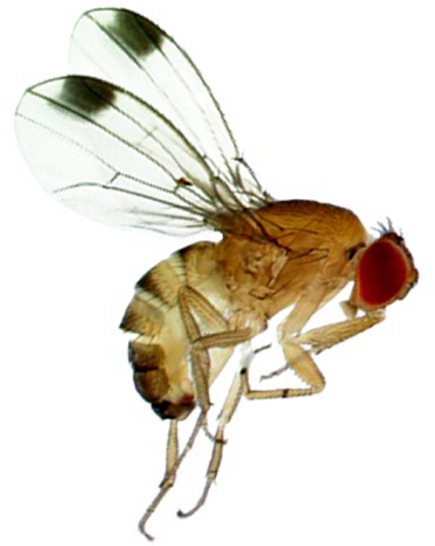We’re as interested in the natural world as the next guy. We’re more interested in the natural world than many next guys. We once made a deal with a mouse who was hanging around our kitchen: “Mouse,” we told him (her?), “we’ve got plenty of food, it’s bitter cold outside, you’re welcome to stay and share. Just don’t get greedy and do keep the place clean.” (In the end, things didn’t work out so well between us, and we got a new pet – a cat.) We think there is a lot to be learned about the environment and our place in it by observing wildlife firsthand.
But in the case of fruit flies – now trying to take over our kitchen – we would prefer to observe the natural world from a distance. We called Jim Dill, pest management specialist at the University of Maine Cooperative Extension to learn more about the bugs.
“This is the time of the year,” he said sympathetically. “The fruit flies are out and about. Everything is ripe. They come in from the outside. You can bring them in on anything. Tomatoes … bananas … they really love bananas. It’s very easy to do that.”
Fruit flies don’t sting or itch. They don’t ruin your nice wool clothes. And they don’t carry disease.
“They are just a nuisance. And they can set up housekeeping and once they set up housekeeping, you’ll have them around,” Dill said. “But there is nothing really bad about them.”
In fact, just as you might expect from a bug specialist, he takes a professional interest. “They’re lots of different fruit flies. The ones we are seeing, they’ve been used for years and years and years in labs in advanced biology,” he continued. “They have all these different mutations: The wing- less ones, red eyes, black eyes, twisted wings, white eyes. They reproduce very fast so you can set up different crosses to teach genetics.”
In a lab, yes, but back to our kitchen. Er, now we’re not saying that we did, but hypothetically speaking, what if someone, not anyone we know of course, had inadvertently eaten a bug or two?
“Like any other proteins, they’ll just dissolve in your stomach,” Dill said. “They can’t live inside you. You’ve probably eaten plenty of them, or the eggs or the larvae, and you’ve just never known. Good protein source.”
Thanks a lot, Jim. Now we really want to get rid of them. What do you recommend? A nice, environmentally friendly method, please.
If they are breeding in your drain – which they like to do – he suggests pouring boiling water down the sink. To trap any that are flitting about, pour a little vinegar into a small jar (Fun fact: fruit flies are also called vinegar flies, because they like the stuff). Make a funnel from a piece of paper and stick it in the jar. The fruit flies will fly in through the funnel, but they won’t be able to fly out. Then you can drown them by shaking the jar around or take them outside and let them go.
But if you take the save-the-bugs route, Dill cautioned, they’ll probably find their way back inside.
“They are so common at this time of year,” he said, “a lot of people see them as a fact of life.”
Copy the Story LinkSend questions/comments to the editors.




Success. Please wait for the page to reload. If the page does not reload within 5 seconds, please refresh the page.
Enter your email and password to access comments.
Hi, to comment on stories you must . This profile is in addition to your subscription and website login.
Already have a commenting profile? .
Invalid username/password.
Please check your email to confirm and complete your registration.
Only subscribers are eligible to post comments. Please subscribe or login first for digital access. Here’s why.
Use the form below to reset your password. When you've submitted your account email, we will send an email with a reset code.